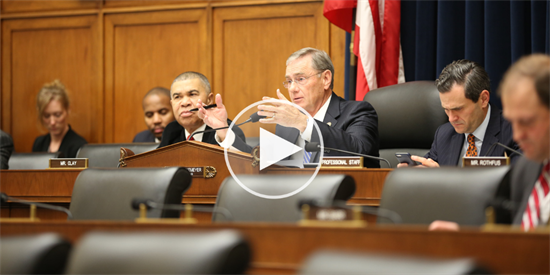Press Releases
Luetkemeyer Urges Reconsideration of CECL Rule
Washington,
December 11, 2018
Congressman Blaine Luetkemeyer (MO-03), Chairman of the Subcommittee on Financial Institutions and Consumer Credit, delivered the following opening statement at a hearing entitled “Assessing the Impact of FASB’s Current Expected Credit Loss (CECL) Accounting Standard on Financial Institutions and the Economy.” There has been much conversation over how to best calculate expected credit losses for financial firms. That conversation has taken place at the Financial Accounting Standards Board and in financial institutions of all sizes across the nation. It has also been discussed in the halls of Congress. Several months ago, I co-hosted a roundtable discussion with several members of the Financial Services Committee, regulators and stakeholders to discuss FASB’s Current Expected Credit Loss, or CECL, standard. FASB leadership later commented to the press that the meeting had been contentious. That was an accurate statement; the meeting was contentious because this is an important issue, and one that could have serious implications for our economy. It deserves our full attention. The final CECL standard, set to be implemented in the coming years, represents, in my judgement, the most significant accounting change to the banking industry in decades. Under this new standard, institutions will recognize the expected lifetime losses at the time a loan or other financial product is recorded. This rule has been done under the guise of investor protection yet applies to every single financial institution in the nation regardless of whether they are publicly traded or privately held. If the purpose of CECL is to protect shareholders, it’s my opinion that private firms, particularly community banks, should be exempt from this rule altogether. For publicly traded firms, FASB should amend the final rule so that it appropriately takes into consideration existing bank capital regimes which already require institutions to hold capital against expected losses. Ultimately, we need a rule and enforcement mechanism that reflects the realities of banking. We also need processes in place that offer greater clarity and collaboration. Since our roundtable, FASB has indicated a willingness to work with Congress and with stakeholders to make changes to the final standard. Some of the suggestions will be highlighted today by our panelists. I hope FASB’s willingness is sincere, and I encourage the Board to take into account any and all alternative proposals discussed. I also want to encourage the federal financial regulators to consider the dramatic challenges that will result from implementation of this standard, and to have their examiners exercise pragmatism and sensibility as banks and credit unions work toward compliance. We have a very distinguished panel of witnesses with us today and we thank them for appearing. ### |

